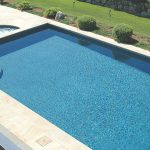Know Your Pool Water: Difference Between Free Chlorine and Combined Chlorine
Imagine floating through your crystal-clear pool, in your serene backyard, with no cloudy substances crowding the view to the bottom of the deep end. Thanks to chlorine, your swimming pool will sparkle right back at you. Chlorine is known to be challenging to work with, which is why understanding the contrast between free chlorine and total chorine plays a critical role in keeping your swimming pool water transparent and looking like the Caribbean paradise.
Free Chlorine + Combine Chlorine = Total Chlorine
What is Free Chlorine?
Free Chlorine is the amount of chlorine that’s available (“free”) to sanitize contaminants in your swimming pool. Essentially, it is the leftover chlorine that has not yet been combined with water. The more “free chlorine” in your pool water the cleaner your pool will be. However, too much chlorine can do some unintended damage such as lung, skin and eye irritation, and possibly provoke asthma in those who are susceptible. High levels of free chlorine can also decrease the pH levels below 7, causing the pool water to be more acidic. Regardless, the free chlorine levels in your swimming pool should exceed combined chlorine levels. You want to reach levels between 1.0 – 3.0 ppm for healthy pool water.
What is Combine Chlorine?
Combine Chlorine is the chlorine in your swimming pool that has already been combined directly with the water and is now contaminated. Chlorine levels should stay between 1.0 and 3.0 ppm. If combine chlorine levels are higher than free chlorine levels, you should increase the amount of chlorine to better clean your pool water. The goal is to achieve a higher level of free chlorine than combined chlorine. You can purchase an inexpensive kit to give you direct readings.
What is Total Chlorine?
Total Chlorine is the amount of free chlorine and combined chlorine totaled in your swimming pool. As a pool owner, you should test your water frequently and consistently using a simple pool water testing kit, so you are aware of the chlorine levels in your pool.
How to increase and decrease your chlorine levels:
If you’re planning to kick the summer off with a pool party, you want your pool looking and operating flawlessly. You can look at your pool water and know if you should increase or decrease the levels by the cloudiness or clearness. However, it is highly recommended that you properly test the levels with a testing kit before adding or removing chlorine.
To Increase Chlorine levels in your Pool
- Raising the chlorine levels of your swimming pool is a lot simpler than lowering it:
- Adding chlorine tablets is one of the easiest ways to increase the pool’s chlorine levels. The tablets come in two different sizes:
- Large: 200g (3 inch diameter)
- Small: 20g (1-inch diameter)
- Increase the chlorine levels in your pool by adding powder or liquid shock. Pool owners tend to shock their pool once a year before their “season”. This eliminates extra contaminants
- Adding chlorine tablets is one of the easiest ways to increase the pool’s chlorine levels. The tablets come in two different sizes:
To Decrease Chlorine levels in your Pool
- Here are the quickest ways to decrease chlorine levels in your pool:
- Stop adding chlorine to the pool water
- Heat the pool water: When water heats up, it allows bacteria to grow, which requires extra chlorine
- Dilute the pool by adding more water: You can do this by draining a portion of the pool water out and adding fresh (untouched by chlorine) water back in
Managing Chlorine in Your Swimming Pool
Makes more sense now, right? What’s most important is consistency and understanding details (chlorine levels) matter as soon as you become a pool owner. For someone who owns a pool, getting to enjoy the element of your spa-like backyard is the biggest perk. If you are struggling to get your Chlorine levels properly balanced reach out to us at Shoreline Pools. As the leading pool service company in the New York Tri-state region, you can reach us by dialing (203) 357-1544 and speak with one of our customer service pool professionals!





